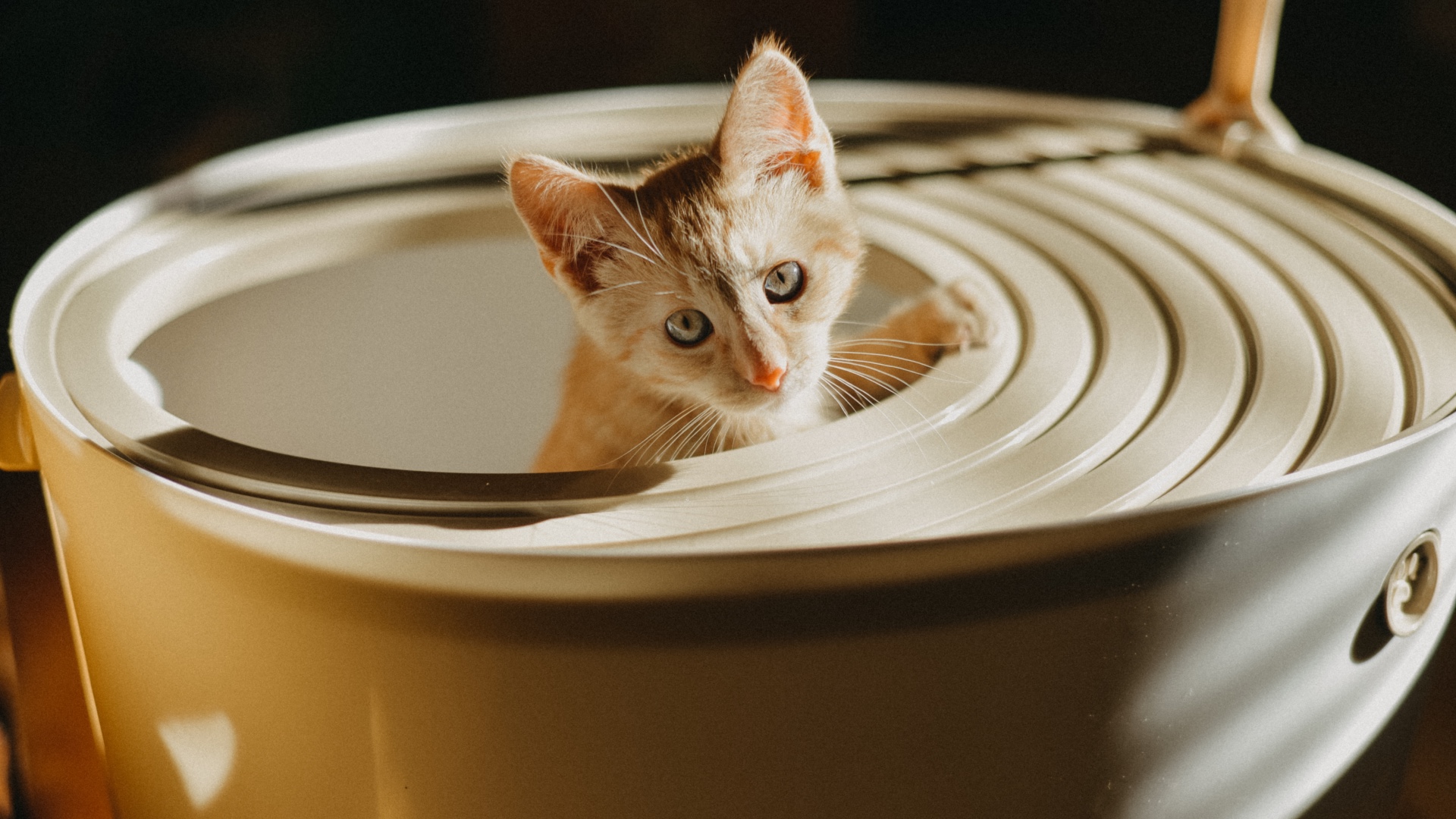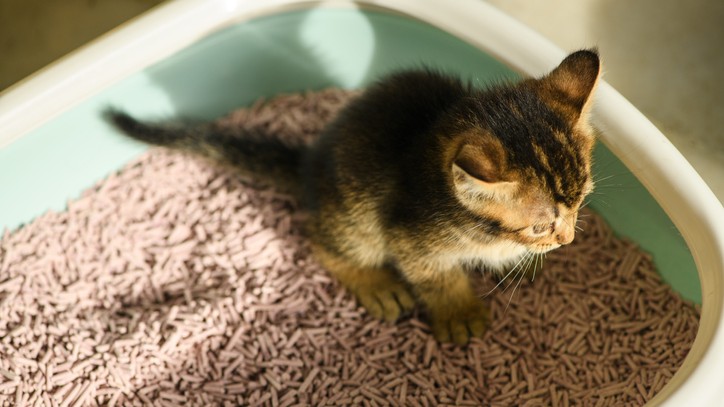Vet reveals how to stop a kitten eating litter — and it all comes down to these four steps
Is your kitten eating litter? Here’s how to put a stop to it (and why they do it in the first place).

Get the best advice, tips and top tech for your beloved Pets
You are now subscribed
Your newsletter sign-up was successful
Is your kitten eating litter? If so, you might be wondering what on earth is going on. After all, when you were trying to decide on a suitable cat litter for your young feline friend, the last thing you probably thought about was the fact that they might view it as a tasty snack!
If you’re feeding your little one the best kitten food and notice that they’ve suddenly started munching on cat litter, it’s something that you’re going to want to pay attention to. While it’s true that kittens explore the world with their mouths, frequently consuming litter may be a sign of an underlying health issue.
Although consuming small amounts of the best cat litter is unlikely to cause a problem, eating litter in larger amounts can result in anything from mild gastrointestinal distress to serious blockages that require emergency surgery. Thankfully, there are ways you can put a stop to this behavior as well as address its cause.
To help you do just that, we turned to experienced vet Dr. Sarah Merrett who shares her thoughts below on why your kitten might be eating litter and what to do if you’re concerned. Plus, she reveals which types of cat litter are safest for your young fur friend to be using.

Sarah Merrett graduated from the Royal Veterinary College in 2005 and has experience in both charity and private practice, most recently working only with cats in a feline-specific clinic. She is an RCVS Advanced Practitioner in Feline Medicine.
Why is my kitten eating litter?
Investing in a quality cat litter means you care for cats and want to make sure they are comfortable. To that end, you’ll have learned how to get a cat to use a litter box and how to litter train a kitten. But if your cat is eating it, then you need to understand why.
“There can be different reasons,” explains Dr Merrett. “Most often, kittens are curious and open to exploring new textures, so are learning what is or isn’t food. However, some health problems – anaemia or nutritional deficiencies – can cause cats or kittens to display ‘pica’.
“Pica is eating nonfood items, which in some cats will include litter. If a cat or kitten is displaying pica, it is advisable to contact your vet so they can rule out medical causes.”
Get the best advice, tips and top tech for your beloved Pets
Will eating litter hurt my cat?
This question is crucial: there will inevitably come a time when your cat will eat litter and you need to know how dangerous this could be. The answer is dependent on how much a cat has consumed. Small doses will pose little to no problems so don’t worry too much if your kittens have been accidentally eating litter stuck to their paws when grooming themselves.
Do be more concerned if the amount being eaten is larger, however. Kittens have small, delicate digestive systems compared to adult cats and some types of litter can form a solid obstruction in your kitten’s gut which can cause serious problems.
“If a cat eats enough clumping litter, litter containing toxins such as sodium bentonite (commonly contained in clumping clay litters), or more than a little of any litter, this can cause respiratory issues or blockages within the gastrointestinal tract, both of which are an emergency,” says Dr Merrett. If your kitten is lethargic, listless or vomiting then take him to the veterinarian immediately.
Which types of cat litter are safest for kittens?

There are various types of litter on the market, and some are more suitable for kittens than others. It’s a good idea, then, to try and avoid certain types including clumping cat litter which are made from sodium bentonite. This will help you to prevent digestive blockages since clumping litter (which forms a clump around the damp patch when your cat goes to the toilet) doesn’t pass through cats very easily.
“Litter that is non clumping, non-toxic, and contains natural, biodegradable materials is preferable,” says Dr Merrett.” Good choices include plant-based pellets, which are made from natural materials such as paper or wood. These pellets tend to be quite large and less appealing to eat and contain fewer chemicals. It’s also worth regularly checking your cat’s litter. Learn how often to clean the litter box and consider the best self-cleaning cat litter boxes.
What to do if your kitten eats clumping litter
This one is simple: seek help, particularly if clumping cat litter is being used. Even if you suspect your kitty has eaten a small amount of clumping litter, it’s best to speak to your veterinarian as a blockage can be very serious.”Definitely contact your vet,” says Dr Merrett. “Clumping litters should only be considered for older kittens and cats, who don’t display signs of eating their litter, and we would recommend avoiding litter containing toxins for all cats.”
How to stop kittens from eating litter
If you’ve spoken to your veterinarian and are sure there are no sinister reasons behind your kitty’s choice of snack, then you can set about preventing him from nibbling. Here is what you could do:
- Remain vigilant. “Kittens should be closely monitored whilst getting used to using a tray or new litter,” explains Dr Merrett.
- Focus their attention. Sometimes cats eat litter because they are bored. “If they are eating it, they should be redirected towards a toy or food,” Dr Merrett says. To that end, invest in the best kitten toys to keep kittens mentally stimulated.
- Seek advice. “You should ensure the litter used is as safe as possible,” says Dr Merrett. “When taking on a new kitten the rescue centre or breeder should be able to advise on what litter the kitten was using, how successful they used it and if there were any concerns with other litters during the time they cared for the kitten. If the kitten is using the litter successfully, provided it is safe, it may be best to keep them on that litter as they grow.”
- Change the food. Sometimes it can be as simple as making sure your kitten is satisfied with their food. It’s worth exploring other options if you find your kitten isn't enjoying what's in their bowl.
And there you go. You now know how to stop your kitten eating litter. At the end of the day, you’re best placed to spot abnormal or unwanted behaviors quickly and to take any action that’s needed to stop your kitten eating litter, whether that’s a new toy or some advice from the veterinarian. You can also explore 7 creative cat litter alternatives you can find around the home and maybe experiment with different types.
For more advice, read our vet's favorite cat litter hacks.
Sara is a freelance journalist and copywriter of many years’ experience with a lifelong love of animals. She’s written for a range of magazines and websites on subjects varying from pet care to travel. A horse rider since the age of five, she’s currently a full time pet slave to horse Blue and gorgeous, goofy English Springer Spaniel Olly. Adorable Olly has a huge sense of adventure and no sense of direction, keeping Sara on her toes.

